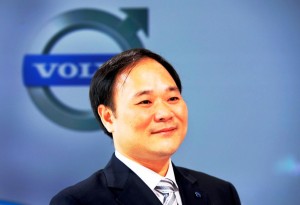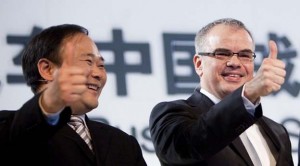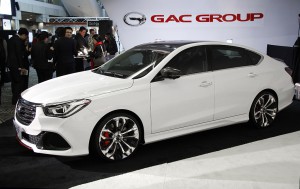
Geely Chairman Li Shufu purchased 9.7% of Daimler AG for $9.2 billion, and expects to partner with them on electrification..
Guangzhou Automotive Corp. or GAC, one of the largest automotive enterprises in China, still plans to move ahead with plans to export vehicles to the United States in 2019 or 2020, a top GAC executive told the annual Global Automobile Forum in Chongqing, China.
Meanwhile Li Shufu, the entrepreneur who developed Holding Group and recently bought 9.9% of Daimler AG, said he expects to collaborate in the future with the German automaker.
Li Shao, GAC vice president, said GAC is fully committed to becoming an international company. The objective of becoming an international company was one of the company’s objectives when it was first organized back in the 1980s, Li said. But very from the very beginning, GAC’s management understood it had a great deal to learn if it wanted to succeed and it also had to do well in China, Li said.
“While internationalization was one of our goals, if you can’t perform well in the Chinese market, how can you expect to grow globally,” he said.
(China cutting tariffs on imported vehicles. Click Here for the story.)
When the Chinese government owned the door to joint ventures with automakers from around the world, GAC quickly signed agreement with a trio of Japanese automakers, Honda, Toyota and Mitsubishi, and set about learning the craft of car building from its new partners, Li Shao recounted.
Over time the effort paid off as GAC now manages six different brands and the quality of the vehicles built in its assembly plans now matches that of the vehicles built in Honda plants around the world. The quality of cars built in its plants – more than 3 million in 2017 – has given it the confidence it needs to enter the intensely competitive markets in Western Europe and the United States.
GAC already exports to 15 different countries around the world as it starts to grow internationally.
Li Shao also said GAC is intent on overcoming its remaining technical shortcomings. At the top of the Iist is that it doesn’t have an electronic transmission but has one under development, which should be ready in about a year. It is also working on the development of silicon chips.
Li noted that GAC has exhibited successfully from its perspective during the North American International Auto Show in Detroit this past January and is continuing to make preparations for entering the U.S. market in 2019 or 2020.
After his presentation, Li Shao diplomatically sidestepped questions about tariffs and trade barriers, noting that the issues are now the subject of government to government discussions between the U.S. and the Peoples Republic of China.

Geely Chairman Li Shufu, left, and Volvo CEO Stefan Jacoby after Shufu signed the papers to take the majority interest in Volvo Cars.
(Click Here for more about Geely Chairman Li Shufu’s plans to shake up the auto industry.)
Geely’s Li Shufu, however, said he believed that, in general, protectionism is a bad idea. Volvo, one of Geely Holdings Co.’s principal assets, is now building a new assembly plant outside Charleston, South Carolina.
Persistence is a factor in the development of the Chinse auto industry, he added. “To do real business, you have to be persistent,” he said.
It also requires taking risk at time. Li Shufu calculated that purchasing Volvo from Ford Motor Co. would give him access to important expertise in research and development. So he put up the $8 billion Ford was asking and even borrowed some of the money from Volvo itself, he recalled.
“We paid it back,” he added.
But it paid off because other companies are now following Volvo’s lead and moving to smaller engines in all kinds of vehicles.
The Volvo deal also underscored the importance of collaboration.
Consequently, he expects to collaborate with Daimler AG and Mercedes-Benz going forward in the future on key areas such as electrification, adding that the threat of “new players” entering the automotive markets could set traditional companies for a “real disaster.”
(For more about GAC’s plans to be first to sell a Chinese-branded vehicle in the U.S., Click Here.)
“In my opinion, we need to collaborate so we can address the challenges together,” Li Shufu told the GAF audience. “We can do it openly in a legal manner,” he added.

